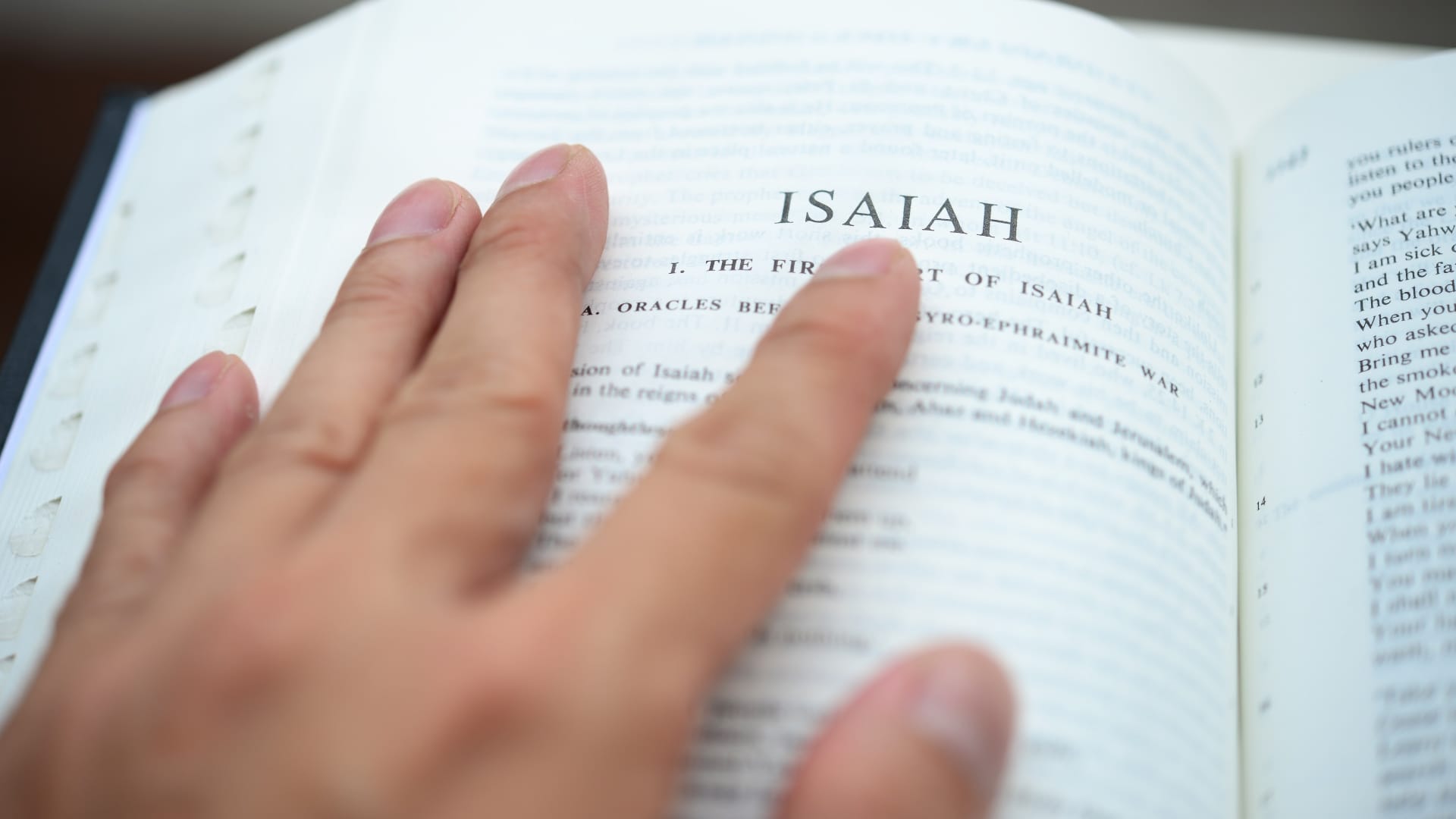Ultimate Hope (Isaiah 7)

Hopelessness
I don't know if you have ever experienced hopelessness. I hope not. Hope is the belief that no matter how bad things are right now, that the situation isn't permanent, and it will get better. Hope is what keeps us going when times are tough.
The only problem with hope is reality. It's hard to maintain hope in a world that can suck it right out of you. I looked up quotations on hope this week, and most of them were depressing. "Blessed is the man who expects nothing" (Alexander Pope). "He that lives on hope, dies fasting" (Benjamin Franklin). "Hope is merely disappointment deferred" (W. Burton Baldry). The message of these quotes is that you can hope if you want, but it's probably not going to get much better. It's best to come to grips with reality rather than imagine that things are going to somehow improve.
So I can think of some times when I, or people close to me, have given up hope: in the middle of depression, marital conflict, joblessness, sickness, or overwhelming pressure. But if you've experienced what it's like to give up all hope, you know that it's not at all a good thing. Hopelessness can almost kill you. Some would say it does.
The people we're going to look at today had given up hope. Here's the problem we're going to have: our problems seem huge, but the problems that people had long ago and far away seem like nothing. It's like a few years ago when I was sitting in a Starbucks on Yonge Street reading about William Lyon Mackenzie. Do you know him? He was a member of the Upper Canada Legislative Assembly and the first mayor of Toronto. In December 1837, he decided the time was ripe to march on Toronto. It's called the Battle of Montgomery's Tavern or the Bar Fight. He marched from a tavern near Yonge and Eglinton down to around College Street. It seems tame to read the history. I sat in the Starbucks and looked out at Yonge Street and tried to imagine the 700 rebels on their way to an ambush. If you work at it, you can almost hear the yelling and smell the gun-smoke. It's anything but tame. This stuff really happened.
I want you to work with me this morning to try to understand the situation that King Ahaz faced 2,700 years ago. I realize I'm asking a lot, because none of us are kings, and we can't imagine what life would have been like for him back then. But let's give it a try. With a bit of work, we may be able to hear the sounds and feel the tensions.
Ahaz became king of Judah, the southern half of what used to be Israel, when he was twenty years old. He couldn't have become king at a more difficult time. I've already mentioned that Israel split into two kingdoms. This happened after the reign of King Solomon. This wasn't the way things were supposed to be, and it was certainly not what God had promised centuries earlier.
It got really bad, because a number of powerful forces formed a coalition against him. Sounds strangely familiar, doesn't it? A leader dealing with a coalition of hostile powers. Damascus and Israel joined forces to try to get rid of Ahaz, so that the nation of Judah would join their alliance against Assyria, which was quickly becoming a world power. Now try to picture what this would have felt like. Assyria on one side, and Israel and Damascus on the other, and Ahaz being squeezed in the middle. When this happened, Ahaz had just begun his reign. So he was young, inexperienced, and he was facing the battle of his life. What do you think he felt like?
We don't have to guess, because Isaiah 7:2 tells us. "Now the house of David was told, 'Aram has allied itself with Ephraim'; so the hearts of Ahaz and his people were shaken, as the trees of the forest are shaken by the wind." This was a big deal. When this brand new, young, and inexperienced king realized that two nations had joined forces against him, he was shaken, and so were his people, like trees in a windstorm. This was not good news. This coalition had already devastated the towns leading right up to Jerusalem, and now they were there wanting Ahaz gone, so they could put their own king in place.
What do you do if you're King Ahaz? Twenty years old, inexperienced, scared out of your mind, and leading a country that's completely demoralized. We're going to look at what he did in just a minute, but we need to first try to put ourselves in his place.
Does he try to negotiate with Syria and Israel? It doesn't look like they're interested in talking. Does he try to get Assyria to come to his defense? After all, Assyria is really what it's all about. Assyria could easily squash Syria and Israel on behalf of King Ahaz – but there would be strings attached. It would probably mean that Judah would come under their control, and Ahaz would become a vassal king, like a puppet.
Does he try to stall? You can only stall so long when you have an army right outside the city walls.
Does he just trust God? That's some of the advice that he received, but it's not so easy to just trust God when you have an army beating down your door.
I hope you sense the tension that this young king is facing. It's not an easy situation. Nobody here has been in exactly this same situation, but many of you can guess how he must have felt based on how you've felt when your back has been up against the wall with nowhere to turn. You know the position of hopelessness. You may even be able to relate to the phrase that Isaiah uses to describe his hopelessness: your heart shaking as the trees of the forest shake before the wind. You know what it's like to lose all hope.
The question is: what do you do?
Hope
It turns out that Ahaz had an advantage that we don't have. Ahaz had prophets, messengers who spoke on behalf of God and reminded them of his covenants. One of them was a man named Isaiah. It's in the middle of this national crisis that Isaiah shows up with what looks to be a surprising message of hope in some of the darkest situations possible.
You can already see this in what we've read so far. Did you notice what he said in Isaiah 7:2? "Now the house of David was told…" Isaiah could have said "the royal court" or "King Ahaz," but instead he said "the house of David," and for a reason. He's reminding Ahaz of God's covenant with David. God had promised to David, "Your house and your kingdom will endure forever before me; your throne will be established forever" (2 Samuel 7:16). Isaiah is reminding us that God has not been silent, and that there is no reason to lose hope no matter how bad things might look. God himself has promised that he will preserve the royal line of David.
God commissioned Isaiah to remind Ahaz of these promises. We read in verse 4: "Say to him, 'Be careful, keep calm and don't be afraid. Do not lose heart because of these two smoldering stubs of firewood—because of the fierce anger of Rezin and Aram and of the son of Remaliah" (Isaiah 7:4). God then went on to promise that within 65 years, Israel would be shattered from being a people. It happened too, by the way. Within a decade or so, Israel fell to Assyria. Within 65 years, the northern kingdom of Israel looked completely different because of all the foreign settlers. 2 Kings 17:24 tells us: "The king of Assyria brought people from Babylon, Kuthah, Avva, Hamath and Sepharvaim and settled them in the towns of Samaria to replace the Israelites. They took over Samaria and lived in its towns."
As hopeless as the situation looked, things weren't as bad as they looked. God reassured Ahaz that he was still in control, and that his promises still stand. This was actually an opportunity for Ahaz and Judah to trust God and claim his promises. But verse 9 ends with a warning: "If you do not stand firm in your faith, you will not stand at all."
One of the worst things I can do at this point is to tell you, "See, you don't have to worry about any of your problems." You are not King Ahaz, and I don't want to pretend that your situation is exactly the same. But it may be more alike than you think. Remember when I said that Ahaz had an advantage because he had prophets? Hebrews tells us that we have something better than a prophet: we have Jesus. And not only that. We have Scripture. We have a record of God's promises. The Apostle Paul wrote, "For no matter how many promises God has made, they are 'Yes' in Christ" (2 Corinthians 1:20). In other words, all of God's promises find their fulfillment in Jesus Christ.
And, in essence, we all face the same test that Ahaz faced. Will we trust God in our trials? We face a choice when we run into crises, and the choice is between independence or trust. Make no mistake: the Bible never promises that we will be spared trials.
But when the trials come, we have the choice of trying to handle them on our own, or in trusting God. Trusting God doesn't mean that we become passive, but it means that we pray, look at Scripture, and put our trust in God's sovereignty despite not understanding what's happening. It means that we turn to his promises, that we lean on him in prayer. It means that we rehearse Scriptures, reminding ourselves that nothing can separate us from the love of Christ (Romans 8:35), that God will look after our needs (Matthew 6:25-34), and that we can cast our anxieties upon him, because he cares for us (1 Peter 5:7).
Someone has written a book When People are Big and God is Small. There are times that people look big, when circumstances seem huge, and God looks small by comparison. This is what Ahaz faced. At the moment of crisis, God looked much smaller than the opposing armies. He wasn't sure God could handle it, so he lost hope. We face the same question. When facing problems, when facing trials, will we see the problems as bigger than God?
I'm not sure how we will respond, but I know how Ahaz responded. We read in 2 Kings:
Ahaz sent messengers to say to Tiglath-Pileser king of Assyria, "I am your servant and vassal. Come up and save me out of the hand of the king of Aram and of the king of Israel, who are attacking me." And Ahaz took the silver and gold found in the temple of the LORD and in the treasuries of the royal palace and sent it as a gift to the king of Assyria. (2 Kings 16:7-8)
Rather than turning to the LORD for help, he turned to Assyria, and become a puppet king. He actually gives up the gold from the temple as payment for the king of Assyrian to come to his aid. We read in 2 Chronicles 28 that Ahaz failed as a king:
The LORD had humbled Judah because of Ahaz king of Israel, for he had promoted wickedness in Judah and had been most unfaithful to the LORD. Tiglath-Pileser king of Assyria came to him, but he gave him trouble instead of help. Ahaz took some of the things from the temple of the LORD and from the royal palace and from the officials and presented them to the king of Assyria, but that did not help him.
In his time of trouble King Ahaz became even more unfaithful to the LORD. (2 Chronicles 28:19-22)
I think this passage is very revealing: "he gave him trouble instead of help." When we hit crisis and don't turn to God, we turn to other things, thinking they will help. They may help in the short term, like Tiglath-Pileser did, but in the end they lead to bondage. They take us farther away from God and, in the end, they give us trouble instead of help.
Before we move on, I want to notice that even in the middle of this crisis, even as Ahaz refused to call on God, God still continued to offer hope. We read in verse 11 that God offered Ahaz a sign to help bolster his sagging spirits. Ahaz responded by turning God down, but even then God offers hope. In verses 14-16 he says:
Therefore the Lord himself will give you a sign: The virgin will conceive and give birth to a son, and will call him Immanuel. He will be eating curds and honey when he knows enough to reject the wrong and choose the right, for before the boy knows enough to reject the wrong and choose the right, the land of the two kings you dread will be laid waste.
This gives me a lot of hope. Even in the middle of doubt on the part of King Ahaz, God continues to reach out. He gives Ahaz a sign that God will spare Judah: a child would be born, and this child would symbolize God's presence and protection in Judah. In the very next chapter, Isaiah records the birth of his own son. In both cases, God makes a promise that before the child is old enough to know right and wrong, or even to say father or mother, that God would deal with Israel and with Syria.
What patience on the part of God. And what a reminder to us how God cares for his people. We can have the same confidence in God no matter how big our problems, no matter how hopeless things seem. As the writer to the Hebrews says:
God has said,
"Never will I leave you;
never will I forsake you."
So we say with confidence,
"The Lord is my helper; I will not be afraid.
What can human beings do to me?"
(Hebrews 13:5-6)
Ultimate Hope
We could end the sermon here, except that this passage isn't just about Ahaz's situation. It's also about another baby born centuries later. We read in Matthew 1 that the Lord appeared to Joseph, who was betrothed to Mary, and said:
Joseph son of David, do not be afraid to take Mary home as your wife, because what is conceived in her is from the Holy Spirit. She will give birth to a son, and you are to give him the name Jesus, because he will save his people from their sins.
All this took place to fulfill what the Lord had said through the prophet: "The virgin will conceive and give birth to a son, and they will call him Immanuel" (which means "God with us"). (Matthew 1:20-23)
Isaiah's son was the immediate fulfillment of the promise that God gave Ahaz, but Jesus is the ultimate fulfillment. Jesus is the fulfillment of God's promise that he will never abandon his people. He is not just a symbol of God's presence and protection; he is the reality of God's promise and protection, here in human flesh. Jesus is God's sign to us that we never have to think that our problems are bigger than he is, that we never need to lose hope.
This would have been very good news for Mary and Joseph, who lived at a time in which Israel was under foreign rule. It meant that God had not forgotten them, and that he would always keep his promises.
So I don't know if you ever lose hope. I don't know if you're ever in an Ahaz situation, in which the problems look bigger than God. Jesus is God's reminder that he will keep his promise, and he will not abandon his people. Ever.
Thank you that foreign armies camped against your people are no match for your promises. Thank you that you put up with us even when we doubt. Thank you most of all that you have given us a sign, whose name is Jesus Christ, to remind us that you will keep your promises, that you will save your people, and that you will never abandon us. In his name we pray. Amen.





